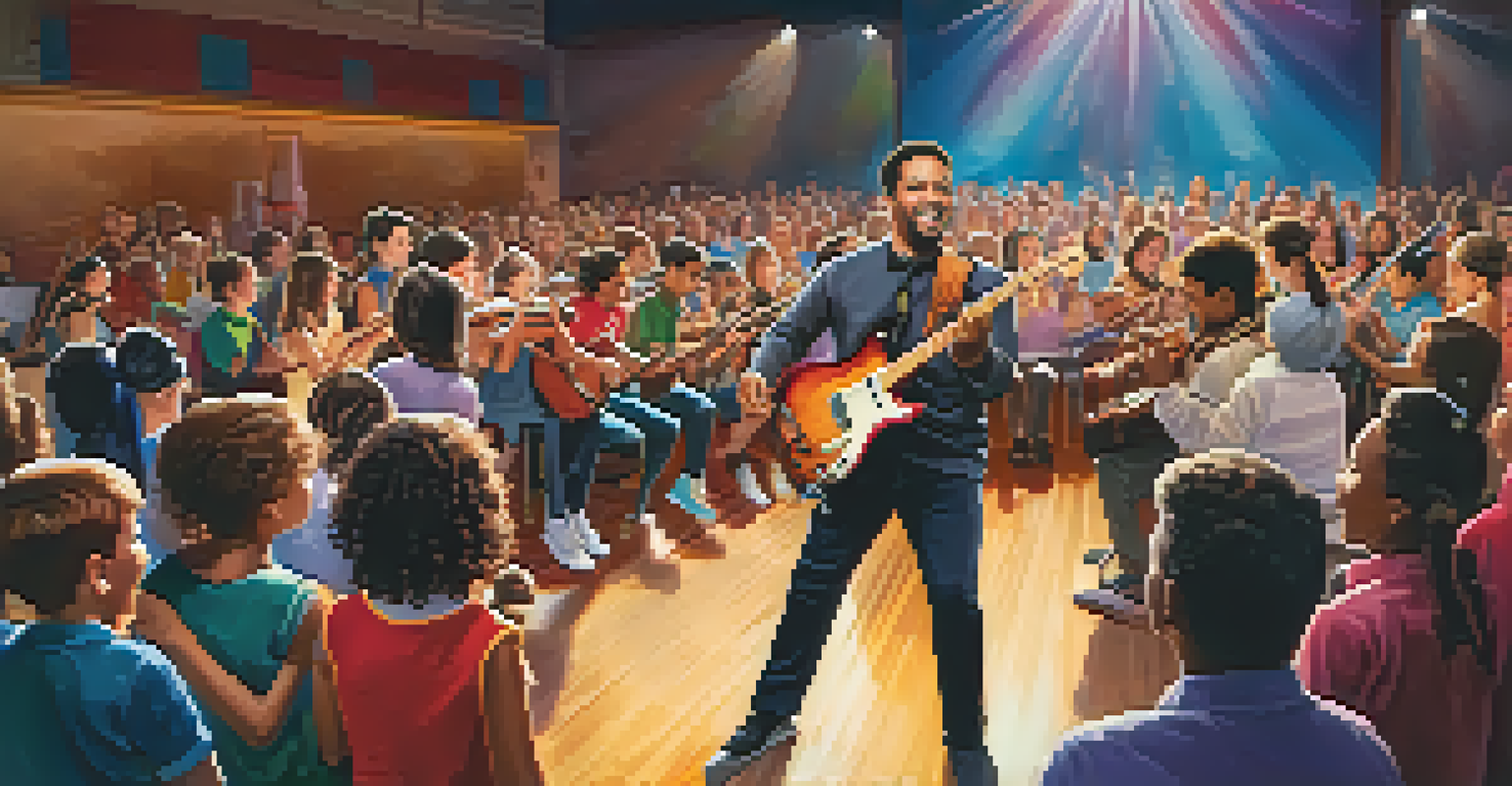The Impact of Music Education on Emotional Intelligence Development

Understanding Emotional Intelligence and Its Importance
Emotional intelligence, often referred to as EQ, is the ability to recognize, understand, and manage our own emotions while also being aware of the emotions of others. It's a crucial skill that influences our relationships, decision-making, and overall mental health. In today's fast-paced world, having high emotional intelligence can lead to better teamwork, communication, and conflict resolution.
Music can change the world because it can change people.
Research shows that individuals with high EQ tend to be more successful in both their personal and professional lives. They are adept at navigating social complexities and can develop deeper connections with others. Furthermore, emotional intelligence is not just about personal success; it also contributes to a more empathetic society.
With the rise of social media and digital communication, emotional intelligence has become even more critical. The ability to interpret emotions accurately can help reduce misunderstandings and promote empathy in an increasingly disconnected world.
The Role of Music Education in Emotional Development
Music education plays a unique role in fostering emotional development among students. By engaging in music, students learn to express their feelings creatively, which can be a powerful outlet for emotions. Whether it's through playing an instrument or singing, music provides a safe space for exploration and expression.

Additionally, learning music requires discipline and perseverance, traits that contribute to emotional resilience. As students face challenges in mastering a piece or performing in front of an audience, they learn to deal with frustration and anxiety, ultimately enhancing their emotional coping skills.
Emotional Intelligence Boosts Success
High emotional intelligence enhances personal and professional relationships, leading to greater success.
Moreover, group music activities, such as band or choir, promote collaboration and communication. These experiences help students understand and respond to the emotions of their peers, fostering empathy and social awareness—key components of emotional intelligence.
How Music Enhances Empathy and Social Skills
Music inherently connects people, allowing for shared experiences that can deepen relationships. Participating in music education encourages students to listen actively and respond to the emotions conveyed through performance. This practice cultivates empathy, as they learn to interpret not only their feelings but also those of others.
Emotional intelligence is the ability to use emotion to think better, make better decisions, and improve your life.
In group settings, students must navigate various personalities and emotions to create harmonious performances. This collaboration teaches valuable social skills like patience, cooperation, and conflict resolution. As they work together to achieve a common goal, students develop a sense of community and mutual respect.
Research indicates that students involved in music education exhibit improved social interactions and a greater understanding of emotional cues. This heightened awareness can lead to improved relationships both in and out of school, contributing to a well-rounded emotional intelligence.
The Science Behind Music and Emotions
Studies have shown that music affects brain chemistry, influencing our emotional states. Listening to or playing music can trigger the release of dopamine, a neurotransmitter that plays a significant role in pleasure and motivation. This biological response underscores the deep connection between music and emotional experiences.
Moreover, music can evoke specific emotions, allowing individuals to explore and process feelings in a unique way. For example, a melancholic piece may resonate with feelings of sadness, enabling students to confront and articulate their emotions. This process is vital for emotional development, as it encourages self-awareness.
Music Education Fosters Empathy
Engaging in music education helps students develop empathy and social skills through collaborative experiences.
Understanding the science of music and emotions paves the way for educators to create more effective music programs. By tailoring lessons to focus on emotional expression, educators can help students harness the power of music to enhance their emotional intelligence.
Music Education as a Tool for Stress Relief
Engaging in music can serve as an effective stress relief tool for students. Whether they are playing an instrument or singing, the act of creating music can provide a much-needed escape from daily pressures. This practice helps to regulate emotions and create a sense of calm, beneficial for mental health.
Additionally, music has been shown to lower levels of cortisol, a hormone associated with stress. By incorporating music education into daily routines, students can learn to manage stress in constructive ways, equipping them with essential coping mechanisms.
As they navigate the challenges of academic life, having a creative outlet like music can make a significant difference. This not only helps in managing immediate stress but also lays the groundwork for lifelong emotional resilience.
The Influence of Music Teachers on Emotional Growth
Music teachers play a pivotal role in shaping students' emotional intelligence. They not only impart musical skills but also foster an environment that encourages emotional exploration. By creating a supportive atmosphere, teachers can help students feel safe to express and discuss their emotions.
Moreover, effective music educators often model emotional intelligence themselves. By demonstrating empathy, active listening, and encouragement, they teach students how to navigate their own emotional landscapes. This mentorship extends beyond music, influencing students' overall emotional growth.
Music as a Stress Relief Tool
Creating and engaging with music serves as an effective way for students to manage stress and promote emotional well-being.
Through positive interactions with teachers, students learn essential emotional and social skills. These lessons contribute to their ability to connect with others, ultimately enhancing their emotional intelligence.
Creating a Curriculum That Supports Emotional Intelligence
To maximize the benefits of music education on emotional intelligence, curricula should be designed with this goal in mind. Incorporating activities that promote emotional expression, collaboration, and self-reflection can make a significant impact. For instance, discussions about the emotional themes in songs can deepen students' understanding of their own feelings.
Additionally, providing students with opportunities to perform and share their music fosters confidence and self-esteem. These experiences help students confront performance anxiety, ultimately strengthening their emotional resilience.

By prioritizing emotional intelligence within music education, educators can help students develop crucial life skills. This comprehensive approach not only enhances their musical abilities but also prepares them for the complexities of emotional interactions in the real world.